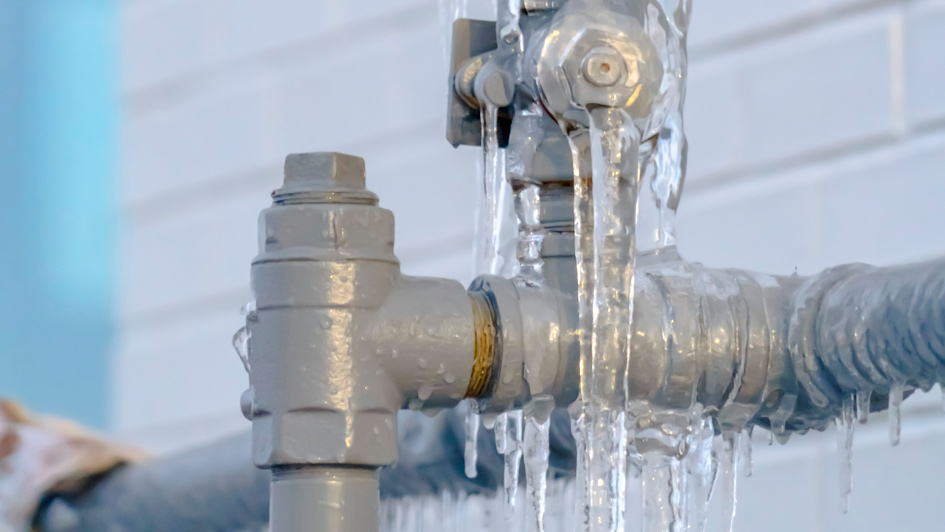
Snow-covered winter weather presents a great opportunity for things like sledding down the neighborhood hill or snowball fights in the front yard. At the same time, winter weather can be hard on your home. Excessively cold conditions can encourage the water lines in your home to freeze and burst, which could lead to severe water damage and lasting negative effects.
If your pipes are frozen solid, you should call a plumber in Manassas to handle the problem. However, there’s several tasks you can perform on your own to stop this from happening – and even minor prevention can go a long way.
What Pipes Are at Risk of Freezing
The pipes at the greatest risk of freezing are uncovered water lines. Frequent locations for uninsulated pipes are within attic crawlspaces, near exterior walls, in the basement or even running beneath a modular home. Water lines that are not properly insulated are at the highest risk.
How to Keep Pipes from Becoming Frozen in Your Home
Thoroughly insulating exposed water lines is a great first step to keeping your pipes ice free. You’ll often have access to most of these materials from a local plumbing company, and may also already have some somewhere in your home.
Try not to wrap other flammable insulation materials where they might light on fire. If you don’t feel confident insulating the pipes on your own, contact your local plumbing services professional in Manassas to get the job done right.
If you do prefer to insulate the pipes on your own, popular insulation materials for pipes include:
- Wraps or roll insulation: Multiple plumbers, hardware stores and national retailers provide insulation – typically fiberglass, foam wraps or pipe sleeves – that you can use to cover or fit around your pipes. They are sold in differing lengths and sizes to satisfy the needs of your home.
- Newspaper: To some degree, newspaper can be used as an insulator. If the weather is going to get cold and you aren’t able to put in more insulation in time, try wrapping uninsulated pipes in this.
- Towels or rags: If you miss the opportunity to add insulation and don’t have any newspaper to use, wrapping especially vulnerable pipes with towels or clean rags as a final effort could be just enough to keep the cold air from freezing the pipes.
Another preventative step you can take to keep pipes from freezing in your home is to fill any cracks that may permit cold air inside your home. Focus on the window frames, which can allow in surprisingly strong drafts. Not only will this help to stop your pipes from freezing, but it will have the additional benefit of making your home more energy efficient.
Five More Ways to Keep Your Pipes from Freezing:
- Open the cabinet doors. Opening the cabinet doors beneath the sinks and other areas of your home with plumbing will permit more warm air from the rest of the room to get to the pipes.
- Letting water drip. Letting water flow by letting your faucets trickle even just a little can help avoid frozen pipes.
- Open interior doors. By opening doors for rooms or hallways, your home can be heated more equally. This is mostly important if there's a room that tends to be colder or hotter than the rest of the home.
- Close the garage door. The exception to the open doors tip is the garage door, which you should keep shut – especially if your water lines run through the garage.
- Keep the heat consistent. Experts encourage setting the thermostat at a stable temperature and leaving it alone, rather than permitting it to get lower at night. Set it no lower than 55 degrees.
How to Keep Pipes from Freezing in an Empty Home
When you’re at home, it’s easy to realize when something breaks down. But what extra steps can you try to keep pipes from freezing in an unused home or vacation home when the damage from a frozen pipe can remain unnoticed for days or even weeks?
As with your primary residence, adding insulation to any exposed water lines, opening interior doors in the home and winterizing the vacant home are the first steps to try at first.
Added Steps to Stop Pipes from Freezing in an Empty Home:
- Leave the heat on. Even though you aren't currently using the home, it’s best to leave the heat on – even if you turn the thermostat down colder than you would if you were there. As with a primary residence, experts suggest keeping the temperature at no lower than 55 degrees.
- Shut water off and drain the lines. If you’re going to be away for several weeks or are winterizing a rustic cabin or cottage, turning the water off to the house and draining the water out of the water lines is one way to stop pipes from freezing and bursting open. Try not to forget to drain the water out of any appliances, including the hot water heater, as well as the toilets. Confirm you empty all the water from the pipes. If you are not sure of how to flush the water from the pipes, or don’t feel confident handling it without any help, a plumber in Manassas will be delighted to assist.
